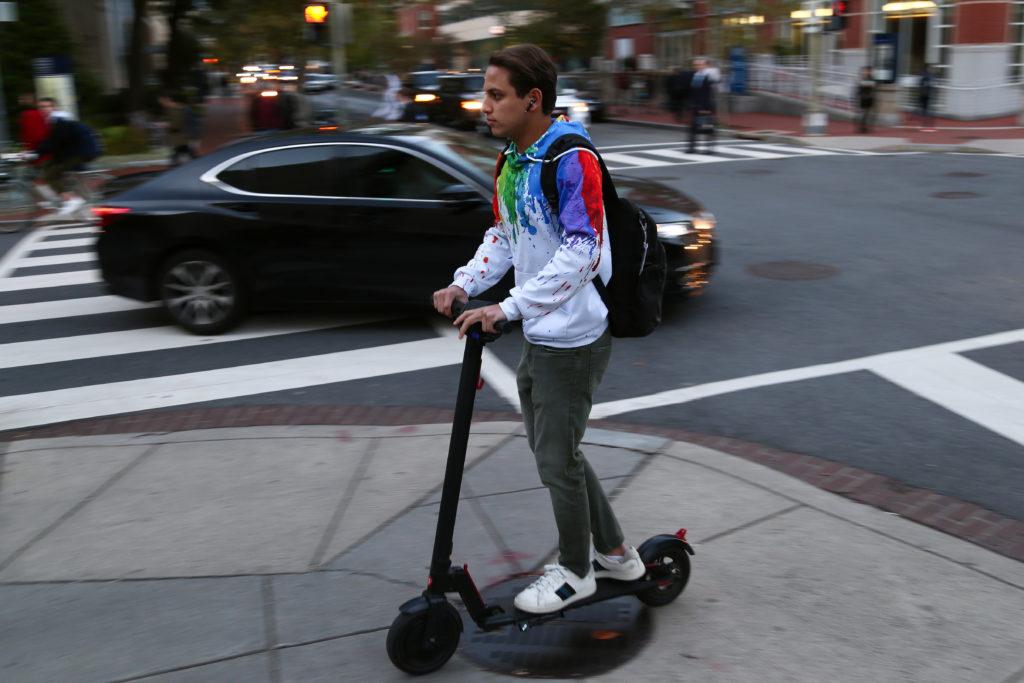D.C. residents will likely see more dockless bicycles and scooters on the streets next year – but they’ll move more slowly.
The District Department of Transportation released new regulations last week that limit the speed of vehicles. The regulations also increase the number of dockless vehicles that companies can operate in the District from 400 to 600, but scooter companies said the new cap is not enough to meet the District’s transportation needs.
The changes are the second adjustment to regulations for dockless vehicles since a pilot program launched in 2017 allowing dockless bike and scooter companies to operate vehicles in D.C. as long as companies share data with DDOT. Residents have voiced safety concerns about dockless vehicles, complaining that they are often left on sidewalks.
DDOT will evaluate updates to the program and will assess companies’ fleet sizes quarterly to determine if the number of vehicles can increase by 25 percent, according to a release.
The new rules cut the top speed that electric scooters can travel at from 15 mph to 10 mph or less and limit electric bikes to 20 mph or less. The regulations also clarify that the 600-vehicle cap does not include vehicles with adaptations for people with disabilities.
Dan Emerine, the manager of DDOT’s policy and legislative affairs division, said the new regulations will allow the dockless vehicle programs to grow in a deliberate and safe manner.
“Many individuals like the dockless program and would like to see it grow to provide more sustainable transportation options,” Emerine said in an email. “Others have expressed concern about the safety and speed of electric scooters, particularly on sidewalks, and the impacts of scooters and bikes parked in inappropriate locations.”
He said the new regulations address residents’ safety concerns by mandating that companies equip dockless bikes with locking mechanisms so they can be locked to stationary objects out of the way of pedestrian traffic. A 10 mph limit will reduce safety hazards and reckless riding, Emerine said.
He added that the regulations enable the District to hold dockless vehicle companies accountable for safety issues because they require the companies to report data about safety incidents and vehicle maintenance directly to DDOT. He said DDOT will be able to track the data “to ensure that companies are staying on top of their responsibility to offer safe transportation options.”
But dockless scooter companies said DDOT must offer a larger cap on vehicle numbers to meet the demand of riders in D.C.
Maggie Gendron, the director of strategic development at Lime, said the company hopes to continue to pursue a relationship with DDOT that prioritizes user needs because Lime riders have requested more scooters in the city, but the company cannot issue the vehicles unless DDOT increases the cap.
Gendron said although the company appreciates that DDOT is welcoming “greener and more affordable shared mobility options,” the 200 extra vehicles are not enough.
“We look forward to working with DDOT, as we have since day one, towards a collaborative solution that provides more transportation options for everyone throughout the District,” Gendron said in an email.
Two dockless bike-share companies, Mobike and Ofo, ceased business operations in D.C. at the end of DDOT’s initial pilot period in July, claiming that DDOT’s limits on vehicle numbers hindered user experience.
Sanjay Dastoor, the CEO for Skip, another dockless scooter company that operates in D.C., said the company is still reviewing DDOT’s new regulations.
“We respect DDOT’s process and are pleased to see that the new permit terms continue to place value on a collaborative relationship between DDOT and scooter providers like Skip,” he said. “We’re looking forward to continuing to work with the city to serve the D.C. area.”





